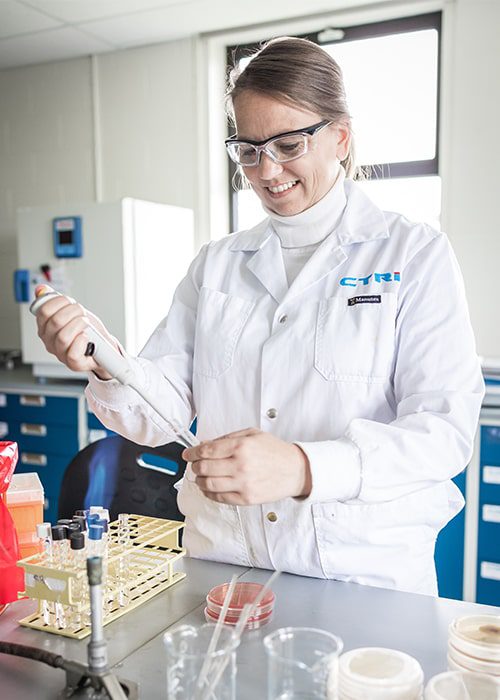
The Centre technologique des résidus industriels (CTRI) proposes a research approach to businesses and organizations that is directed towards practical and quickly applicable solutions in the context of their waste management operations.
The CTRI offers innovative technological solutions, applied technological research & development and high-tech trials to support businesses that want to find a practical solution to their industrial waste.
CTRI team members have substantial expertise that allows us to satisfy your needs in analytical services and the identification of the best ways to manage your biomass waste. Whether these needs are related to the:
The CTRI ensures rapid, quality service. Highly qualified staff and regular follow-up of our apparatuses ensures the quality of our services.
We provided the CTRI with a modern infrastructure and pilot-scale equipment that allows you to better adopt environmentally friendly processes for the management and valorization of your biomass waste: among others, the CTRI offers you services of:
CTRI staff stands ready to travel to participate in trials or proceed with sampling.
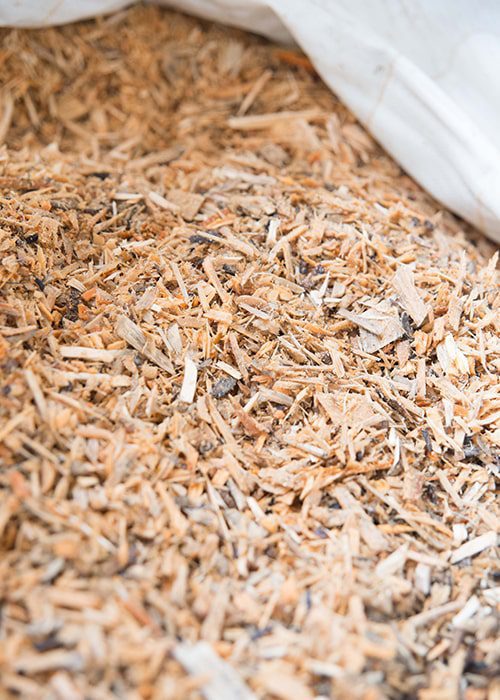 In partnership with Airex Energy, this project allows us to optimize the parameters of biomass torrefaction in the CarbonFX process and the parameters of densification by granulation. We aim to reach maximum energy density as we respect the norms of quality for torrefied biomass pellets. We conducted trials on continuous pilot torrefaction and granulation processes. The CTRI remains the only Quebec Research Centre that offers trials of this kind.
In partnership with Airex Energy, this project allows us to optimize the parameters of biomass torrefaction in the CarbonFX process and the parameters of densification by granulation. We aim to reach maximum energy density as we respect the norms of quality for torrefied biomass pellets. We conducted trials on continuous pilot torrefaction and granulation processes. The CTRI remains the only Quebec Research Centre that offers trials of this kind.
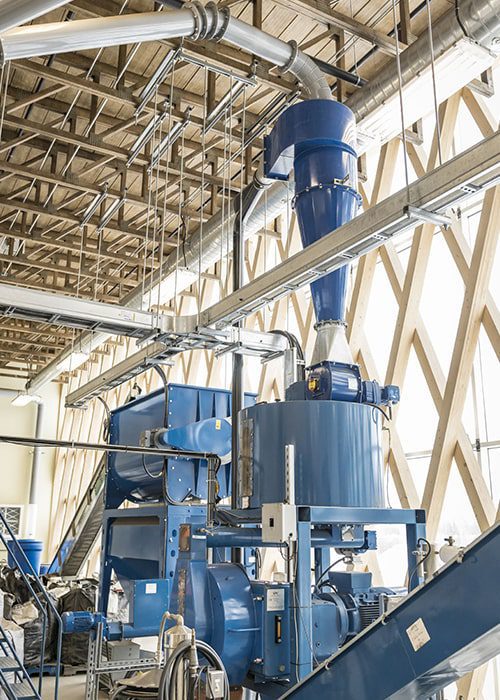 Within the context of the Support Program for Technological Intensification of the Quebec Ministry of the Economy, Innovation and Exportation, CTRI experts were able to optimize the parameters for direct drying of sludge with a chain flail dryer developed by ABRI-Tech© (a Quebec small-to-medium sized business) to avoid the phenomenon of thick sludge adhesion on the walls of the drying chamber. Adaptation and optimization activities carried out by the CTRI concern:
Within the context of the Support Program for Technological Intensification of the Quebec Ministry of the Economy, Innovation and Exportation, CTRI experts were able to optimize the parameters for direct drying of sludge with a chain flail dryer developed by ABRI-Tech© (a Quebec small-to-medium sized business) to avoid the phenomenon of thick sludge adhesion on the walls of the drying chamber. Adaptation and optimization activities carried out by the CTRI concern:
– Test conditions: mass flow at output, optimal drying airflow, drying enthalpy and optimal fuel delivery.
– Design of certain key elements of the dryer: length of the drum, ventilator characteristics and burner characteristics.
 CTRI experts have worked on a supply chain model of biomass from quick-growing crops. We tested different varieties of willows (Salix sp.) and hybrid poplars (Populus spp.) on many parcels of land and different places in the Abitibi-Temiscamingue region. We aimed to determine which varieties adapt best to the edaphic and climate conditions of the region.
CTRI experts have worked on a supply chain model of biomass from quick-growing crops. We tested different varieties of willows (Salix sp.) and hybrid poplars (Populus spp.) on many parcels of land and different places in the Abitibi-Temiscamingue region. We aimed to determine which varieties adapt best to the edaphic and climate conditions of the region.
Likewise, we conducted many harvest tests on quick-growth crop parcels and on unplowed land.
 In connection with the transformation of the ethanol forest biomass, CTRI experts made major technological breakthroughs that will secure a return on investment of the chemical hydrolysis process of the biomass and considerably reduce its impact on the environment. Indeed, the use of electrokinetic methods of purification (separation of acids and sugars) of the hydrolysate resulted in sugars favourable to alcoholic fermentation. The proportion of bioethanol that exists in the compound obtained and analyzed by chromatography reached 80%.
In connection with the transformation of the ethanol forest biomass, CTRI experts made major technological breakthroughs that will secure a return on investment of the chemical hydrolysis process of the biomass and considerably reduce its impact on the environment. Indeed, the use of electrokinetic methods of purification (separation of acids and sugars) of the hydrolysate resulted in sugars favourable to alcoholic fermentation. The proportion of bioethanol that exists in the compound obtained and analyzed by chromatography reached 80%.
 CTRI experts have relevantly revealed as a historic first the antimicrobial properties of boreal forest essential oils. A new microbiological approach adjusted to the traditional technique of microdilution led to an improved perception of these properties up to 93%, equivalent to a minimum inhibitory concentration of 0.2% w/v. Similar to this effectiveness discovered against numerous microbic pathogens, the antioxidant properties of these oils have shown to be comparable to those of a few other well-known exotic essential oils. Analysis of their density and chemical constituents by gas-solid chromatography has confirmed the adjustment validity of these more realistic approaches. Finally, we examined these essential oils from Quebec and recognized their quite high potential in active ingredients for commercial health and personal care products with beneficial impact on public health.
CTRI experts have relevantly revealed as a historic first the antimicrobial properties of boreal forest essential oils. A new microbiological approach adjusted to the traditional technique of microdilution led to an improved perception of these properties up to 93%, equivalent to a minimum inhibitory concentration of 0.2% w/v. Similar to this effectiveness discovered against numerous microbic pathogens, the antioxidant properties of these oils have shown to be comparable to those of a few other well-known exotic essential oils. Analysis of their density and chemical constituents by gas-solid chromatography has confirmed the adjustment validity of these more realistic approaches. Finally, we examined these essential oils from Quebec and recognized their quite high potential in active ingredients for commercial health and personal care products with beneficial impact on public health.
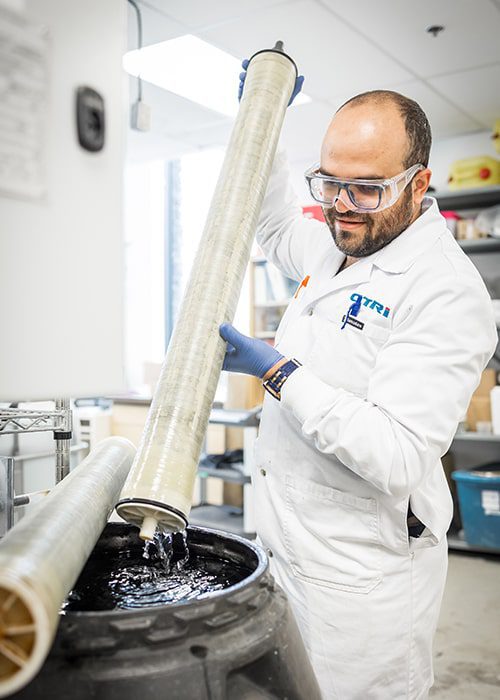
Our experts are there to support you in your approach of the:
Contaminated sites are characterized by organic matter and nutrient deficit, contamination and geotechnical instability. For many years, the CTRI team has been analyzing factors that allow the improvement of plant growth in these conditions. We base our approach on:
Tree species remain undesirable in several locations in mining sites: dikes, covers with capillary barrier effects and geo-membranes. The CTRI has already carried out many pilot projects with different species of plants and microorganisms that allow us to control the propagation and growth of unwanted plants depending on the size and conditions of your site. Our expert will analyze the risk associated with the presence of these species and the development of their root system; he or she will propose an approach adapted to these site conditions.
We use of plants to decrease the concentrations of harmful elements or components. These methods include:
CTRI team members have sound expertise that allows you to satisfy your needs in terms of analytical services and the identification of the best avenues to highlight your undervalued minerals:
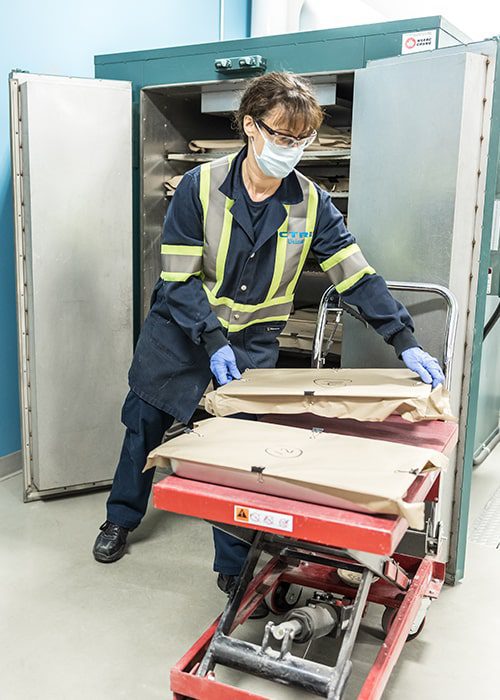
Whether during the exploration of newly discovered mineral deposits or trials on new reactants or technologies, the CTRI offers you a range of services that allow you to assess the recovery of your metals through laboratory tests or, alternatively, ongoing tests in a semi-industrial plant.